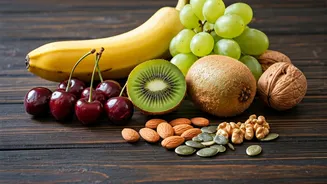The Sleep-Boosting Power
The quest for a good night's sleep often leads people to consider various remedies, but the impact of diet is frequently overlooked. Certain foods contain
compounds and nutrients that can significantly influence sleep patterns. These foods work by impacting the brain's neurotransmitters, such as serotonin and melatonin, which play crucial roles in regulating sleep. Magnesium, often present in sleep-promoting foods, aids muscle relaxation, helping to calm the body and mind. Tryptophan, an amino acid, is another key player, as it is a precursor to serotonin and melatonin. By incorporating these foods into your diet, you can create a favorable internal environment for sleep, potentially reducing the need for sleep aids and enhancing your overall well-being. Focusing on your evening meals allows you to take a proactive step toward achieving better sleep without medications.
Almonds: A Nutty Choice
Almonds are a tasty snack that can quietly enhance your sleep. They are packed with magnesium, an essential mineral that has been shown to improve sleep quality. Magnesium assists in reducing cortisol levels, which is the stress hormone that can interfere with sleep. Furthermore, almonds provide a small amount of tryptophan, which is an amino acid that converts into melatonin and serotonin, two hormones essential for regulating sleep cycles. A handful of almonds before bed might help you fall asleep faster and stay asleep longer. It's a convenient, natural method that you can easily integrate into your evening routine for better sleep. Consider eating a small portion, which makes it easier to digest without causing any unnecessary stomach discomfort throughout the night.
Turkey: A Classic Sleep Aid
Turkey is renowned for its sleep-inducing properties, primarily because it's rich in tryptophan. Tryptophan is an amino acid that the body utilizes to create both serotonin, which helps regulate mood and promote relaxation, and melatonin, the sleep hormone that tells your body when it's time to sleep. Eating a small portion of turkey with your evening meal can significantly increase your tryptophan intake. The protein in turkey can keep you feeling satisfied without causing digestive distress. Additionally, turkey often provides nutrients that support overall well-being. While many associate turkey with Thanksgiving feasts, incorporating it into your diet can become a regular habit. Ensure it is not too heavy or heavily spiced, so it is easier to digest.
Kiwi: Tiny Sleep Powerhouse
Kiwis are a surprisingly effective food for improving sleep. Research has indicated that eating kiwis before bed can significantly improve sleep quality, including how quickly people fall asleep and how long they stay asleep. Kiwis are packed with antioxidants and serotonin, which is a neurotransmitter that helps regulate sleep. They also contain essential nutrients, such as vitamins C and K, which support overall health. Kiwis have a naturally sweet and tart taste. This makes them a tasty snack that helps to prepare the body for a more restful sleep cycle. The combination of nutrients and sleep-promoting compounds means you can consume them every day. For optimum results, eat 1–2 kiwis an hour before bed and incorporate kiwis into your regular diet for enhanced benefits.
Warm Milk: A Soothing Ritual
The practice of drinking warm milk before bed is a classic bedtime ritual that still offers benefits. Milk, especially warm milk, is frequently associated with relaxation. Milk has tryptophan and calcium, which are thought to have a positive impact on sleep. Tryptophan is converted into serotonin and melatonin, hormones that encourage sleep, while calcium can help the brain use tryptophan. For some people, the ritual of preparing and drinking warm milk provides a sense of comfort and aids in relaxation, making it easier to drift off to sleep. However, not everyone can tolerate milk, so there are other options to consider, such as dairy-free alternatives such as almond or oat milk, which still possess sleep-promoting properties.
Walnuts: Brain-Boosting Sleep
Walnuts, frequently praised for their brain-boosting benefits, can also enhance sleep. Walnuts are a good source of melatonin, which is a hormone that regulates the sleep-wake cycle. Consuming walnuts can increase the melatonin levels in your body. It helps regulate your sleep patterns. Walnuts also contain essential nutrients such as magnesium and tryptophan, contributing to relaxation and sleepiness. They are a beneficial snack. Eating a handful of walnuts before bed can gently prepare the body for sleep. You may find an improvement in your overall sleep quality and an easier time falling asleep. To make the most of walnuts' advantages, keep portion sizes moderate, as walnuts have a high calorie content.
Chamomile Tea: A Herbal Calm
Chamomile tea is a well-known natural remedy for sleep, and the practice has roots in ancient times. Chamomile has apigenin, an antioxidant that binds to specific brain receptors that can reduce anxiety and initiate sleepiness. Drinking chamomile tea before bed can create a calming environment that prepares your body for sleep. The warmth of the tea also adds to its soothing effects, creating a sensory experience that eases you into a relaxed state. Chamomile tea is caffeine-free, making it suitable for consumption at night. Incorporate chamomile tea into your evening routine as a nightly ritual to help signal to your body that it is time to unwind and fall asleep. This herbal infusion can provide a pleasant and beneficial way to improve the quality of your sleep.













